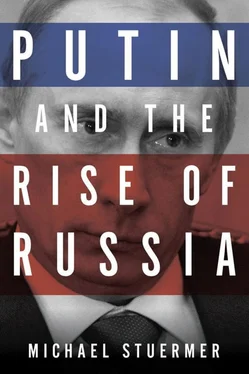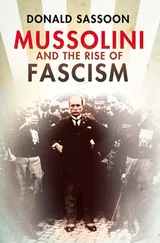At the height of the crisis on 25 July 1998 Putin was, unexpectedly for the outside world, appointed head of the FSB, the Federal Intelligence Service from which he had come and where he had his personal and ideological roots. He was now in a key position, but far from safe, and his future was anything but assured. He owed too much to Yeltsin, whose rule was visibly in decline and would in any case end soon, and with it the good fortune of all those associated with the democratic tsar. Putin, according to his own account, was not enthusiastic about his appointment. And he had good reason.
He was a mere lieutenant-colonel, on reserve since 1990, and there were many generals ahead of him who had every right to believe that they had older claims to lead the service. Every military or quasi-military organization reacts with anger and frustration, if not open obstruction, to those who are put on the fast track by political masters and bypass everybody else. Putin was enough of an experienced player not to underestimate the dangers. Nevertheless, he fired no fewer than one third of the 6000-strong top echelon, sending others to the provinces, and won respect. But for how long? Inevitably, the FSB and its newly appointed boss were drawn into the struggle for the Yeltsin succession, with no holds barred. The end – keeping Luzhkov and Zyuganov away from the levers of power – justified the means.
By late summer of 1997 the crisis was feeding the crisis. The State Duma refused to cut all social programmes no longer affordable, and the financial world offered no encouragement. The fundamental problem was, as in 1985, the breakdown of oil and gas prices. Prime minister Kiriyenko was compelled to announce a three-month moratorium for servicing the debt owed to the outside world. The population had gone through a similar experience in 1992 and in 1994, when the currency suddenly lost one third of its value and purchasing power. This time no one wanted to be caught by surprise. A run on the banks ensued. Everybody who had a chance changed roubles into dollars, causing the rouble to collapse. After a few days there was no more money, not even a banking system – only despair, disorientation and mounting debt. Shops were empty, the state was bankrupt. Inflation was rampant. The neo-capitalist system was no more. And with it foundered the hope for democratic and liberal renewal. State authority was on the wane. Putin, now head of the FSB, decided on disarming some special military units in Moscow. Obviously there were rumours of an impending coup.
At the end of August 1997 Yeltsin dismissed young Kiriyenko and asked the seasoned Chernomyrdin to head the government. General Lebed, who had become governor of Krasnoyarsk and whose reputation for both military success and diplomatic finesse should calm down hot tempers, was recalled from his Siberian fiefdom to be part of the new team. It was touch and go. The communists and their left-wing allies saw the chance to achieve now what they had failed to bring about in 1992-3: dislodging Yeltsin, reversing whatever reforms had been effected and turning Russia into a parliamentary system with communists at the levers of power. When Chernomyrdin was blocked by the Duma and Luzhkov continued to be unacceptable to Yeltsin, suddenly the ‘family’ had no one to put on the chessboard. The oil price, continuing at its catastrophic low, would bring no salvation. The financial crisis was grinding on, and on top of everything the political players in Moscow had lost direction. Trying times indeed for the new man at the helm of the FSB. This kind of open crisis, he might have vowed to himself, should never happen again. But he may well have concluded that only in a crisis of vast proportions would a man from nowhere have a chance to rise to the top.
Among the president’s men it was Grigori Yavlinski who came up with the name of a compromise candidate. His name was Yevgeny Primakov. A heavily built Arabist and former journalist, Primakov had been a former KGB-resident in the Middle East before joining the IMEMO, in Soviet days the Kremlin’s foremost think tank, and becoming its influential director. Primakov accepted his appointment but, feeling he was a mere stopgap, insisted that in order to secure safe passage through the Duma the communists should have some share in the future government.
This was not only a tactical move. It reflected, once again, the tragic truth that the majority of Russian people, much as in other post-communist countries, were willing to embrace democratic reform while refusing to accept the hardship inherent in modernization and the market economy: ‘lost in transition’ – to quote the title of Lilia Shevtsova’s book on the Yeltsin and Putin legacy.
Putin’s time had not yet come. Containing disaster was the programme of Primakov and his government, especially paying wages and pensions to an exasperated population. There was not much help coming from outside. Primakov put his trust in compromise, while outside trust in Russia had all but broken down and foreign direct investment became a trickle. No one could imagine that very soon oil prices would pick up and strong tailwinds would push the Russian ship of state to a better future and help the government to stay on top of affairs. Meanwhile, Primakov made two strategic mistakes. He allied himself with Moscow’s top dog Luzhkov, too close for comfort in the eyes of the ‘family’. And he took on Berezovsky, the Kremlin’s patron, for financial misconduct and sharp practices. In so doing, Primakov fired some trustees of the financial clans from the Kremlin bureaucracy and, in good secret service tradition, put in his own people from the former foreign intelligence.
The ‘family’ reacted by surrounding Primakov with people not his own in order to pre-empt his move to the presidency. Nikolai Bordyuzha became Secretary of the National Security Council; Vladimir Putin, while continuing as head of the FSB, a full member. All the power ministries were put under the direct control of the President, eating away at Primakov’s power. Putin, while some members of Yeltsin’s entourage were defecting in the direction of Luzhkov and others assumed to be tomorrow’s masters, had finally made it to the inner circle. He was now, according to Alexander Rahr, the man to save the future of the Yeltsin ‘family’. ‘They trusted him, they saw in the head of the FSB their most important ally and protector of their strategic interests.’ Meanwhile, Putin reorganized the service, brought more of his old friends from St Petersburg into key positions, marginalized Primakov’s people and expanded the network that he had started building while in the presidential administration. General Victor Cherkesov, for example, once a fellow-student in St Petersburg and a friend from childhood days, with something of a parallel career to Putin’s in the KGB, was promoted to deputy chief of the FSB with special responsibility for economic crime.
Sergei Ivanov, another former KGB general, also from St Petersburg, was made head of analysis and strategy; later on, under the Putin presidency, he was to turn up as minister of defence and, since mid-2008, first deputy prime minister.
Meanwhile, the health of Yeltsin was deteriorating and the Moscow rumour mill produced, at regular intervals, news about his impending demise. Each time Yeltsin surfaced on TV, but it was obvious that his health could not forever withstand the waves of vodka he was consuming, sometimes even in the morning. By that time, the Yeltsin ‘family’ had gone through most or all of the political options and consumed all the more reform-minded prime ministers. What was left was to put all bets on the old KGB and its modern-day reincarnation. This put the head of the FSB into a key position. He concentrated all the loose ends in his hands because he must have understood that in this situation the stakes were very high: win or lose, with very little in between. And there was no doubt that he wanted to win.
Читать дальше











